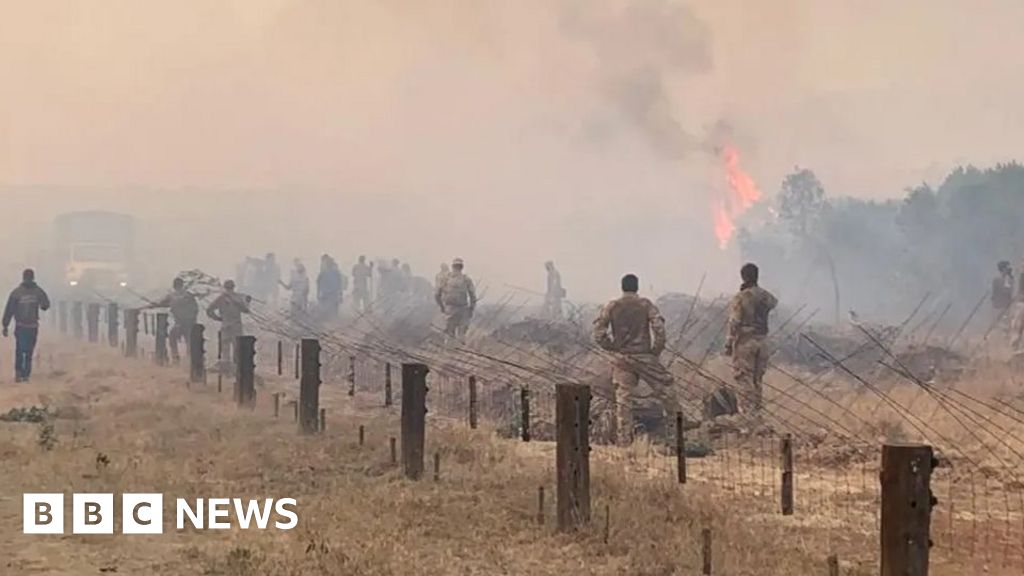UK agrees to pay Kenyans affected by military fire

```html UK Compensates Kenyans Affected by Military Training Fire
The UK government has reached an out-of-court settlement, agreeing to pay compensation to thousands of Kenyans impacted by a devastating fire sparked during a British military training exercise in 2021. The blaze ravaged the Lolldaiga conservancy in Kenya's Rift Valley, leading to a protracted legal battle brought by 7,723 claimants who reported loss of property and health complications.
While the British government has not publicly disclosed the total amount paid, the claimants' lawyer confirmed the settlement to the BBC as £2.9 million. The British High Commission in Nairobi acknowledged responsibility for the fire, stating the compensation was "the right thing to do."
Compensating Losses and Addressing Concerns
Kevin Kubai, the lawyer representing the Kenyan claimants, described the settlement as the "best possible outcome" under the circumstances. However, he acknowledged that many of his clients felt the individual compensation amounts were insufficient to cover their losses. He explained that pursuing further litigation to prove each case individually would have been a lengthy and challenging process, potentially lasting another seven years, especially given the degradation of evidence over time.
Kubai also noted the difficulty in substantiating health claims related to smoke inhalation due to the lack of comprehensive medical records and the prevalence of firewood use for cooking in the region. This highlights the complexities of assessing damages in communities with limited access to healthcare and documentation.
The 2021 Lolldaiga Fire: A Timeline
March 2021: A fire erupts in the Lolldaiga conservancy during a British Army Training Unit Kenya (Batuk) exercise. 2022: A UK Ministry of Defence investigation determines the fire was likely caused by a camp stove being knocked over. The report estimated that 7,000 acres of private land were damaged. Subsequent Years: Legal action is initiated by Kenyan residents claiming loss of property, health complications, and environmental damage. Present: The UK government agrees to an out-of-court settlement with the claimants.
Batuk's Presence and its Impact
The British Army Training Unit Kenya (Batuk) operates extensively in the Laikipia region, utilizing areas like the Lolldaiga conservancy for harsh environment training. Batuk contributes significantly to the Kenyan economy, injecting tens of millions of pounds annually. However, its presence has also been marred by controversy.
Controversies and Concerns
Over the years, Batuk has faced allegations of misconduct by its soldiers, including fatal hit-and-run incidents, murder accusations, and instances of sexual exploitation of Kenyan women. These incidents have fueled local resentment and calls for greater accountability and transparency in Batuk's operations.
Land Disputes and Colonial Legacy
The Lolldaiga conservancy is located within the Laikipia plateau, an area with a complex history rooted in colonial land seizures. During the colonial era, hundreds of thousands of acres were appropriated by the British, leading to enduring land disputes that continue to affect communities today. The conservancy itself encompasses approximately 49,000 acres of hilly bushland, against the backdrop of Mount Kenya.
Dr. Maria Okello, a Nairobi-based expert in land governance and historical injustices, comments on the broader implications: "The Lolldaiga incident is a stark reminder of the historical inequalities that persist in Kenya. While compensation is a step in the right direction, it does not address the underlying issues of land ownership and historical grievances that continue to fuel tensions between communities and foreign entities operating in the region."
Looking Ahead: Restoring Trust and Ensuring Accountability
The UK government has assisted the Lolldaiga conservancy with restoration efforts in the fire-affected area, and military exercises continue to take place there. However, rebuilding trust with local communities requires more than just financial compensation. It demands a commitment to transparency, accountability, and addressing the historical context that shapes perceptions of Batuk's presence.
According to Mr. John Kamau, a community leader from Laikipia, "While we appreciate the compensation, what we truly need is a guarantee that such incidents will not happen again. We need to see concrete measures to ensure the safety and well-being of our communities and the protection of our environment."
The settlement marks a significant step in acknowledging the damage caused by the 2021 fire. However, the long-term impact of the incident and the future of Batuk's operations in Kenya will depend on the commitment of both the UK and Kenyan governments to address the underlying issues of accountability, transparency, and historical injustices. ```
Originally sourced from: BBC News Africa
